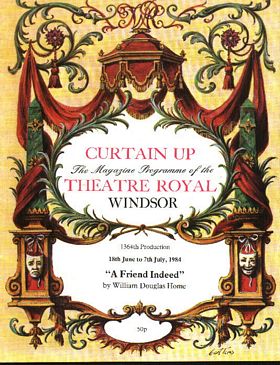A FRIEND INDEED by
William Douglas Home
Venue: Theatre Royal Windsor 1984
Directed by: Jan Butlin
Venue: Theatre Royal Windsor 1984
Directed by: Jan Butlin

Characters in order of appearance
| Miri | Jo Kendall |
| Sir John Holt British Minister to the Vatican | Geoffrey Palmer |
| Sheila Hibury | Julie Dawn Cole |
| Lady Hibury | Colett Gleeson |
| Sir Lionel Hibury Permanent Head F.O. | Derek Nimmo |
| Bobby Butterfield | Mark Colleano |
| Mrs. Rosie Butterfield | Moira Lister |
Review
I trust that the Theatre of Comedy has not already run short of comedies to revive, for A Friend Indeed is the least distinguished it has produced since the company took over the Shaftsbury and is so slight that a concerted blow from the audience might well send it wafting away. It was done in the West End in the mid-sixties and it is probably significant that apparently no one around at that time can recollect anything about it. Fragile even by the comedy standards of William Douglas Home, it sets us down in a gracious, sun-filled apartment overlooking the rooftops and monuments of Rome and immediately introduces us to a comic Italian maid, following that up with a couple of British diplomats in full ceremonial fig, two elegant middle-aged ladies, one American, and an insipid young pair who have met on the Isle of Capri a few days earlier and, this being the early rather than the swinging sixties, wants to get married right away instead of just moving in together.
The plot revolves around the fact that the girl is the daughter of the Permanent Head of the Foreign Office, and the boy the son of the rich American widow. But the boy is also the son of the Permanent Head of the Foreign Office as well, the result of a spot of diplomatic dalliance in Washington during the war. But everything turns out alright, because the girl is not his daughter after all, but has been a sired by Sir Lionel Hibury’s best friend the British Minister to the Vatican, in whose flat the action takes place.
Despite the whole of the plot having been revealed before the interval, the second act as it happens, is much better than the first, thanks largely to the two diplomats, played with all the comedy resource of which they are capable by Derek Nimmo and Geoffrey Palmer, trying to keep each other out of the picture, the ladies (Moira Lister and Colette Gleeson) having cheerfully confided their indiscretions to one another long before. As an example of the author's ability to make bricks with very little straw and hold them together with no mortar, it possibly deserves some kind of award.